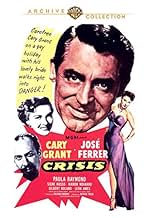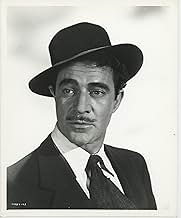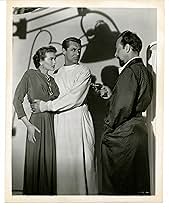IMDb RATING
6.7/10
2K
YOUR RATING
While on vacation in a Latin American country, an American neurosurgeon and his wife become tangled in a revolutionary uprising against a tyrannical dictator.While on vacation in a Latin American country, an American neurosurgeon and his wife become tangled in a revolutionary uprising against a tyrannical dictator.While on vacation in a Latin American country, an American neurosurgeon and his wife become tangled in a revolutionary uprising against a tyrannical dictator.
- Awards
- 1 win total
José Ferrer
- Raoul Farrago
- (as Jose Ferrer)
Lillian Adams
- Nurse
- (uncredited)
Carlos Barbe
- Friend of Farrago
- (uncredited)
Orlando Beltran
- Doctor's Assistant
- (uncredited)
Audrey Betz
- Servant
- (uncredited)
George Brady
- Student
- (uncredited)
Robert Cabal
- Very Young Man
- (uncredited)
Andy Carillo
- Man at Table
- (uncredited)
Bridget Carr
- Guest
- (uncredited)
Teresa Celli
- Rosa Aldana
- (uncredited)
Carlos Conde
- Man
- (uncredited)
Rita Conde
- Pretty Woman
- (uncredited)
- Director
- Writers
- All cast & crew
- Production, box office & more at IMDbPro
Featured reviews
Most IMDb critics claim that this is unlike any other Cary Grant role, but I think his performance is remarkably reminiscent of "Notorious." Agent Devlin was more romantic, to be sure, but Dr. Ferguson is also a cool, calm, rational, and duty-bound man in a political maelstrom: he's a surgeon, vacationing in a banana republic whose tumor-stricken dictator shanghais him. The result is a trenchant dramatic character, which Grant does very well, supported by Ramon Novarro and Gilbert Roland, who always add quality to a movie. And I'd single out two other performers:
The Spanish composer Vicente Gómez graces only one scene, in a café, but he plays a soulful guitar solo that I wanted much, much more of.
And then there's José Ferrer as the dictator. He almost steals every scene, especially when he watches Grant's amateur surgical team drill into a fake human skull, rehearsing for the surgery awaiting the dictator himself tomorrow. When the rehearsal is done, Ferrer is sweating visibly and fumbling with a cigarette. He makes it easy for you to project yourself into that makeshift O. R. with the student surgical team-- you with a brain tumor and a captive surgeon who makes no effort to hide his antipathy.
But Grant holds his own. "Tell them never to use that instrument on the brain again," he says to his translator. "It might suck a piece right out of the brain." Ferrer hears, of course, and through his sweat he asks, "How did it go?" Grant drops the stitched-up skull in a garbage pail and says, "Oh, it went quite well. But you died."
The Spanish composer Vicente Gómez graces only one scene, in a café, but he plays a soulful guitar solo that I wanted much, much more of.
And then there's José Ferrer as the dictator. He almost steals every scene, especially when he watches Grant's amateur surgical team drill into a fake human skull, rehearsing for the surgery awaiting the dictator himself tomorrow. When the rehearsal is done, Ferrer is sweating visibly and fumbling with a cigarette. He makes it easy for you to project yourself into that makeshift O. R. with the student surgical team-- you with a brain tumor and a captive surgeon who makes no effort to hide his antipathy.
But Grant holds his own. "Tell them never to use that instrument on the brain again," he says to his translator. "It might suck a piece right out of the brain." Ferrer hears, of course, and through his sweat he asks, "How did it go?" Grant drops the stitched-up skull in a garbage pail and says, "Oh, it went quite well. But you died."
Cary Grant is a noted surgeon traveling with his wife (Paula Raymond) in a Latin American country when there's a "Crisis."
This 1950 black and white film also stars Jose Ferrer, Leon Ames, Ramon Novarro, and Gilbert Roland. Grant, as Dr. Ferguson, and his wife are trying to leave the country due to political unrest when they are kidnapped and brought to the home of the country's dictator, Raoul Farrago (Ferrer).
There, they learn from his wife (Signe Hasso) that the leader is dying of a brain tumor, and options for an operation are few as no one wants him to live. Ferguson agrees on certain conditions.
Ultimately, his wife is involved in a riot, and he sends her home. It isn't until the surgery is over that he learns that certain things have been kept from him.
This is actually a very good and underrated film, not the usual Cary Grant type of role or movie, which in itself should have sparked some interest when it was released.
People know the handsome Grant and his debonair persona, his gift for physical comedy and the way he has with a line - but it's nice to remember occasionally that underneath all that star power and tailored suits there's a fine actor.
Here he plays a man who makes a commitment to a patient he plainly doesn't like, and he has to fight to control his emotions. His anger over the situation makes this difficult.
Ferrer is terrific as a violent man who thinks of his people as dumb children as he feathers his own nest with money that rightfully belongs to them. As his Evita-like wife, Signe Hasso has a chance to show her capabilities, and she's excellent - charming on the surface, worried about her husband, and hard as nails underneath.
Hasso was a wonderful Swedish actress often relegated to B movies or to small roles in A films. Eventually she turned to theater and television. Here we see, had the roles been there for her, what a find she truly was.
It's always great to see old-timers Gilbert Roland and Ramon Novarro, the latter as Colonel Dragon, and the former as a revolutionary who wants Grant to kill Farrago on the operating table. Actually he's no better than Farrago, and Ferguson gets a bird's eye look at oppression politics.
A very good film; worth seeing for Grant, Ferrer and Hasso.
This 1950 black and white film also stars Jose Ferrer, Leon Ames, Ramon Novarro, and Gilbert Roland. Grant, as Dr. Ferguson, and his wife are trying to leave the country due to political unrest when they are kidnapped and brought to the home of the country's dictator, Raoul Farrago (Ferrer).
There, they learn from his wife (Signe Hasso) that the leader is dying of a brain tumor, and options for an operation are few as no one wants him to live. Ferguson agrees on certain conditions.
Ultimately, his wife is involved in a riot, and he sends her home. It isn't until the surgery is over that he learns that certain things have been kept from him.
This is actually a very good and underrated film, not the usual Cary Grant type of role or movie, which in itself should have sparked some interest when it was released.
People know the handsome Grant and his debonair persona, his gift for physical comedy and the way he has with a line - but it's nice to remember occasionally that underneath all that star power and tailored suits there's a fine actor.
Here he plays a man who makes a commitment to a patient he plainly doesn't like, and he has to fight to control his emotions. His anger over the situation makes this difficult.
Ferrer is terrific as a violent man who thinks of his people as dumb children as he feathers his own nest with money that rightfully belongs to them. As his Evita-like wife, Signe Hasso has a chance to show her capabilities, and she's excellent - charming on the surface, worried about her husband, and hard as nails underneath.
Hasso was a wonderful Swedish actress often relegated to B movies or to small roles in A films. Eventually she turned to theater and television. Here we see, had the roles been there for her, what a find she truly was.
It's always great to see old-timers Gilbert Roland and Ramon Novarro, the latter as Colonel Dragon, and the former as a revolutionary who wants Grant to kill Farrago on the operating table. Actually he's no better than Farrago, and Ferguson gets a bird's eye look at oppression politics.
A very good film; worth seeing for Grant, Ferrer and Hasso.
I first saw this movie in 1950 when it was released. I thought it was a good drama, more or less accurately portraying many of the problems of Latin American governments, with good dialog particularly between the two male leads. Incidentally, I did not find either character particularly sympathetic, but no matter. Many of the comments here have mentioned the resemblance to Eva Peron of the Signe Hasso character. Just an interesting observation: In the much later made for TV movie, Evita Peron, Signe Hasso and Jose Ferrer both had roles. He was the tango singer who seduced Evita and took her to Buenos Aires. She was the aging actress who befriended the young Dva Duarte and found herself in a jail cell. Of the two movies, Crisis is by far the better film. Evita Peron was a ripoff.
CRISIS remains perhaps the only film that is completely forgotten when lists of Cary Grant films are offered. Even some of Grant's lesser vehicles are discussed, in depth, but Richard Brooks' CRISIS, which features a really stellar cast is 'lost' in contemporary cinema circles. There is no logical reason for this. Grant gives one of his very rare straight dramatic performances -- and one very very different from the dramatic range in NONE BUT THE LONELY HEART. It is a strong, forthright piece of work. The film deserves rediscovery for any number of reasons -- Grant's work, the first sign of Brooks' major talent... and one of the few (if only) Grant films that deals with modern political issues. I had remembered the film very well from my youth and never saw it listed for TV showings or any retrospectives. Thus, finding a rare DVD copy was wonderful ... and, surprisingly, very rewarding. Here's to someone pulling CRISIS out of obscurity and into a rung on the Cary Grant pantheon.
Even someone who's been keeping track of old movies for many years can be forgiven if this one slipped under the radar. Surgeon Cary Grant and his wife are vacationing in a South- or Central-American paradise when they are abducted by government forces. Seems the country's dictator (Jose Ferrar) has a brain tumor but is afraid to leave the country due to revolutionary activity. Grant is pressured into performing the operation. Only problem is, the guerrillas have captured his wife, threatening to kill her if Ferrar survives the operation. But the letter informing him of this never reaches Grant.... Supporting cast includes Leon Ames, Ramon Navarro (Ben-Hur of the silent era) and Signe Hasso as Ferrar's wife, an Evita Peron clone. This is a tense and often intelligent drama (and slightly out of Grant's usual debonair range) that doesn't merit the obscurity it seems to be buried in.
Did you know
- TriviaOriginally banned in Mexico, Central and South America.
- GoofsThe doctor announces his fee is ten percent of the patient's income, but does not say whether this means monthly, annual or some other period.
- Quotes
Raoul Farrago: At least permit me to thank you. You have done a great service not only to me but to the people of my country.
Dr. Eugene Norland Ferguson: I only saved your life I didn't vote for you.
Raoul Farrago: Neither did they.
[smiling]
- Crazy creditsPROLOGUE: "The time is now. The scene of the action is fictitious, but the forces at play in this story are not fictitious."
- Alternate versionsAlso available in a computer colorized version.
- ConnectionsReferenced in Secret Publicity - Forbes Taylor Remembers the Making of State Secret (2021)
- How long is Crisis?Powered by Alexa
Details
Box office
- Budget
- $1,616,455 (estimated)
- Runtime
- 1h 35m(95 min)
- Color
- Aspect ratio
- 1.37 : 1
Contribute to this page
Suggest an edit or add missing content

































